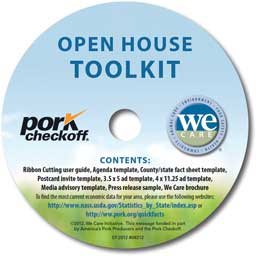 News from the National Pork Board
News from the National Pork BoardAs of last fall, Transport Quality Assurance (TQA) certification numbers stood at 29,073 handlers and 526 advisors. The Pork Quality Assurance (PQA) Plus program continued to gain momentum in 2012 with 56,338 certified individuals, 71 trainers, and 1294 advisors in the program. The newest addition to the PQA Plus program, the site assessment, has also gained ground this year with over 16,500 sites achieving site status, representing 75% of the US swine inventory. However, even with these gains in certification, several areas for improvement were identified through the third-party verification process. The top three areas include medication and treatment records, daily observation records, and load-out facilities. The Pork Checkoff will continue to invest in the third-party verification process to measure the effectiveness of the PQA Plus program, as well as to provide credibility to packers and customers that pork producers are doing the right thing.
2013 PQA Plus revision update
As a preview for the roll-out of the revised Pork Quality Assurance (PQA) Plus program at this year’s World Pork Expo, here are the main components seeing changes.
Changes to GPPs: Changes to current good production practices (GPPs) will reflect adaptation of the “We Care” initiative. These changes include the addition of expanded public health establishing environment stewardship, worker safety, and tools for continuous improvement.
Testing: The addition of a testing component to the PQA Plus certification adds credibility to the pork industry by displaying a commitment to continuous improvement and education. The test will consist of no more than 25 questions related to animal well-being and pork safety. In order to pass the open-book test, participants may miss three questions.
Online certification: While first-time certifications must be obtained through face-to-face training with a PQA Plus advisor or trainer, individuals who wish to renew their PQA Plus certification will be able to do so online. Individuals must contact their PQA Plus advisor to set up and verify the online certification process. PQA Plus certifications will remain valid for a 3-year time period.
Site assessment: Site assessments are a crucial part of the PQA Plus Certification Program. Site certification shows a producer’s commitment and interest in producing a safe quality product, while at the same time promoting animal well-being and a safe environment. Upon completion of a site assessment, a producer must submit a corrective action plan for all non-compliances and follow up with the PQA Plus advisor in order to receive site-assessment status. The frequency of site assessments will remain at the 3-year renewal time frame.
Trainers/advisors certifications: Trainer/advisor certifications will continue to be conducted face-to-face. This group of individuals is receiving more extensive instructions and information needed to most effectively instruct producers.
For more information, contact Dinah Peebles at DPeebles@pork.org or 515-223-2795.
 We Care Open House Kits
We Care Open House Kits
Know of someone looking to host an open house for his or her new hog facility? The We Care Open House Kits are designed to provide producers with the promotional tools necessary to gain media and community attention on the opening or redesign of his or her barn. Compiled through a user-friendly CD, the Open House Kit includes newspaper advertisements, a sample agenda, sample press release, and other tools to promote the open house. Each document highlights the We Care initiative, showing the public that pork producers are committed to doing the right thing.
To order your We Care Open House Kit, contact the Pork Checkoff Service Center at 800-456-7675 or visit porkstore.pork.org.
New nutritional research booklet available
A new Checkoff publication, Pork Industry Nutritional Efficiency Consortium Research 2007-2011, contains key findings and applications for improving nutritional efficiency, based on research funded through this consortium representing pork producers and allied industry. Examples of how pork producers can apply this nutritional-efficiency research include the following:
• Incorporating alternative feedstuffs into swine diets to mitigate the high cost of feed while maintaining animal performance and pork quality.
• Understanding the impact of feed processing and enzyme utilization on enhancing nutrient availability.
• Considering the key role genetics and the breeding herd play in improving whole-herd nutritional efficiency.
To learn more about these and other Checkoff-funded research programs, please visit pork.org/research or contact Chris Hostetler at CHostetler@pork.org or 515-223-2606.
Checkoff funds more than $6 million in research in 2012
In 2012, the National Pork Board awarded more than $6.4 million in research grants to fund 82 projects in areas such as swine health, food safety, public health, animal welfare, swine nutrition, swine genetics, environment, and human nutrition. This makes the National Pork Board, through its Checkoff funds, one of the largest sources of farmer-supported research in the nation.
Checkoff research provides multiplying effect on progress
To better determine the return on investment made by America’s pork producers, the Checkoff reviewed the research projects funded from 2005 to 2009. As part of this effort, Checkoff contacted researchers who worked on Checkoff-funded projects during these years. Of the 227 contacted, nearly 80% offered feedback on 320 of the 403 total Checkoff-funded projects. Here are some of the main findings.
The $24.5 million invested in research during these 5 years directly resulted in over $45 million of additional research, an increase of 185% in additional research value that benefitted the industry. The $1.5 million of Checkoff investment in preharvest pork-safety research allowed an additional $8.7 million of research to be conducted. The $2 million of Checkoff investment in nutritional efficiency research led to an additional $11 million of research. The projects resulted in 822 publications, outreach, and further action. Nearly one half of these studies resulted in papers published in peer-reviewed journals. Checkoff-funded research was cited 1475 times in additional research, building additional science-based information from the original research projects: 158 swine-health publications related to PRRS were cited in research 402 times and 100 swine-health publications on subjects other than PRRS were cited in research 358 times.
For more information, contact Paul Sundberg at PSundberg@pork.org or 515-223-2764.
